Anthony Albanese announces final wording for Voice to parliament referendum
Anthony Albanese choked up as he revealed the wording for the Indigenous Voice to parliament referendum at an emotional press conference.
Australians have found out what they will be asked at the referendum for an Indigenous Voice to Parliament and how the constitution would be changed to enshrine the advisory body.
Anthony Albanese had tears in his eyes as he revealed the wording of the referendum question and proposed constitutional amendment in an emotional press conference on Thursday, after months of consultation with Aboriginal and Torres Strait Islander leaders.
Speaking at Parliament House, the Prime Minister made an impassioned plea to Australians to support the Voice and confirmed the body would be able to advise executive government as well as federal parliament if the referendum were successful later this year.
Mr Albanese released the wording flanked by Attorney-General Mark Dreyfus, Indigenous MPs including Linda Burney and Indigenous leaders who sat on the government’s referendum working group such as academic Megan Davis.
Australians will be asked: “A Proposed Law: to alter the constitution to recognise the First Peoples of Australia by establishing an Aboriginal and Torres Strait Islander Voice. Do you approve this proposed alteration?”
If a majority of Australians vote in favour of the Voice, the Constitution would be amended as follows:
1. There shall be a body, to be called the Aboriginal and Torres Strait Islander Voice;
2. The Aboriginal and Torres Strait Islander Voice may make representations to the Parliament and the Executive Government of the Commonwealth on matters relating to Aboriginal and Torres Strait Islander peoples;
3. The Parliament shall, subject to this Constitution, have power to make laws with respect to matters relating to the Aboriginal and Torres Strait Islander Voice, including its composition, functions powers and procedures.
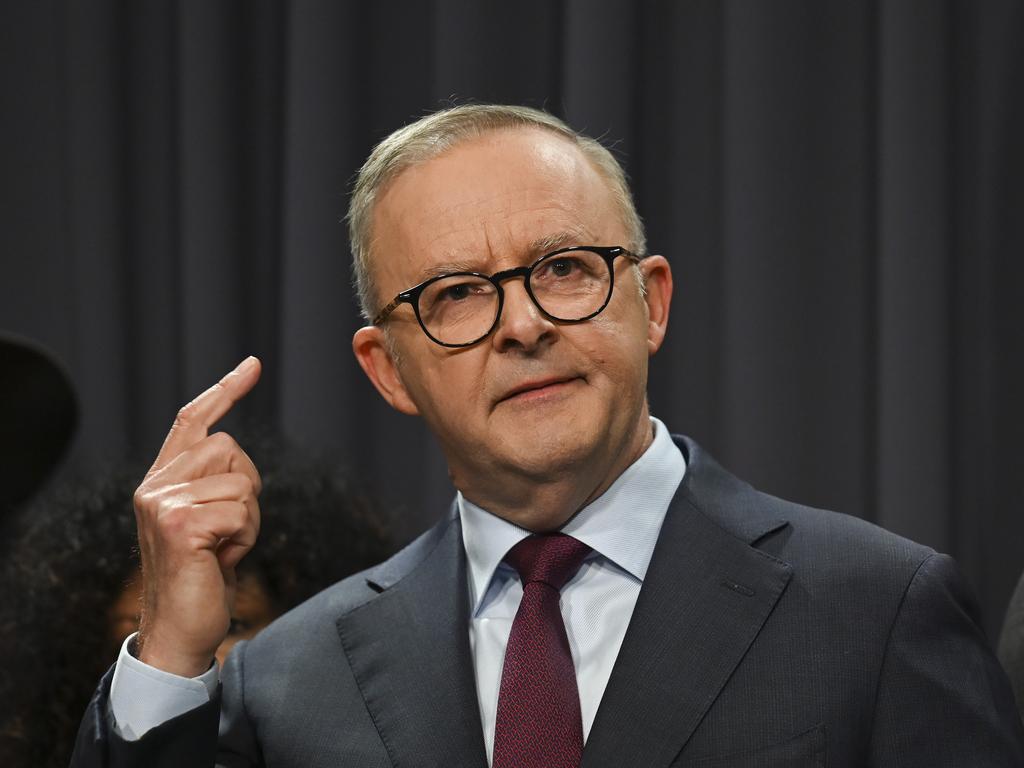
Federal cabinet approved the wording on Thursday morning after Mr Albanese received a final proposal on Wednesday night from the referendum working group which has been debating the amendment to be put to Australians.
The wording of the question and the proposed constitutional amendment will be put to federal parliament next week. Parliament will vote on the wording no later than June before the referendum is held sometime in the final three months of the year.
Mr Albanese choked up and had to pause to compose himself as he vowed the referendum would go ahead.
“To be very clear, because I was asked this question this morning: Are there any circumstances in which this will not be put to a vote? The answer to that is no. Because to not put this to a vote — ” he began.
Mr Albanese continued: “To not put this to a vote is to concede defeat. You only win when you run on the field and engage. And let me tell you, my government is engaged. We’re all in.”
He said he respected people’s right to have a different opinion and to say no.
“That is their democratic right,” he said.
“But I would ask for there to be a debate based upon facts, not based upon scare campaigns which have no basis, not based upon nonsense and not based upon issues that aren’t respectful.”
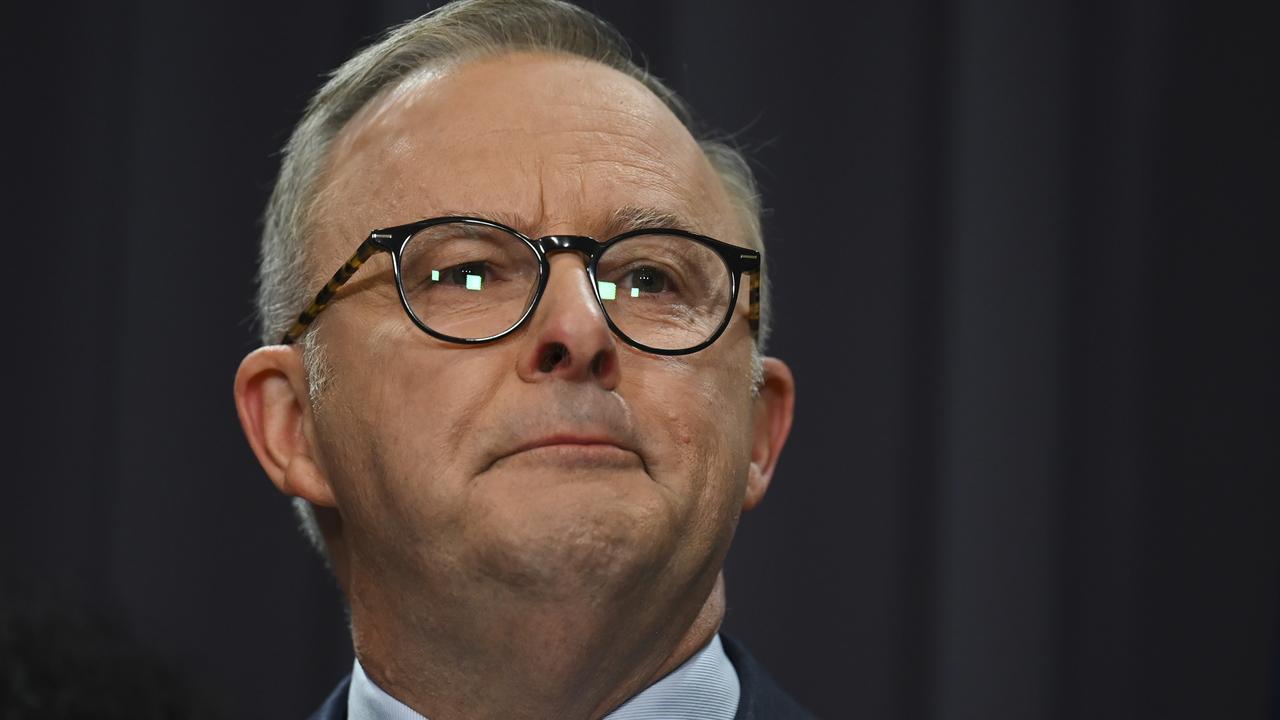
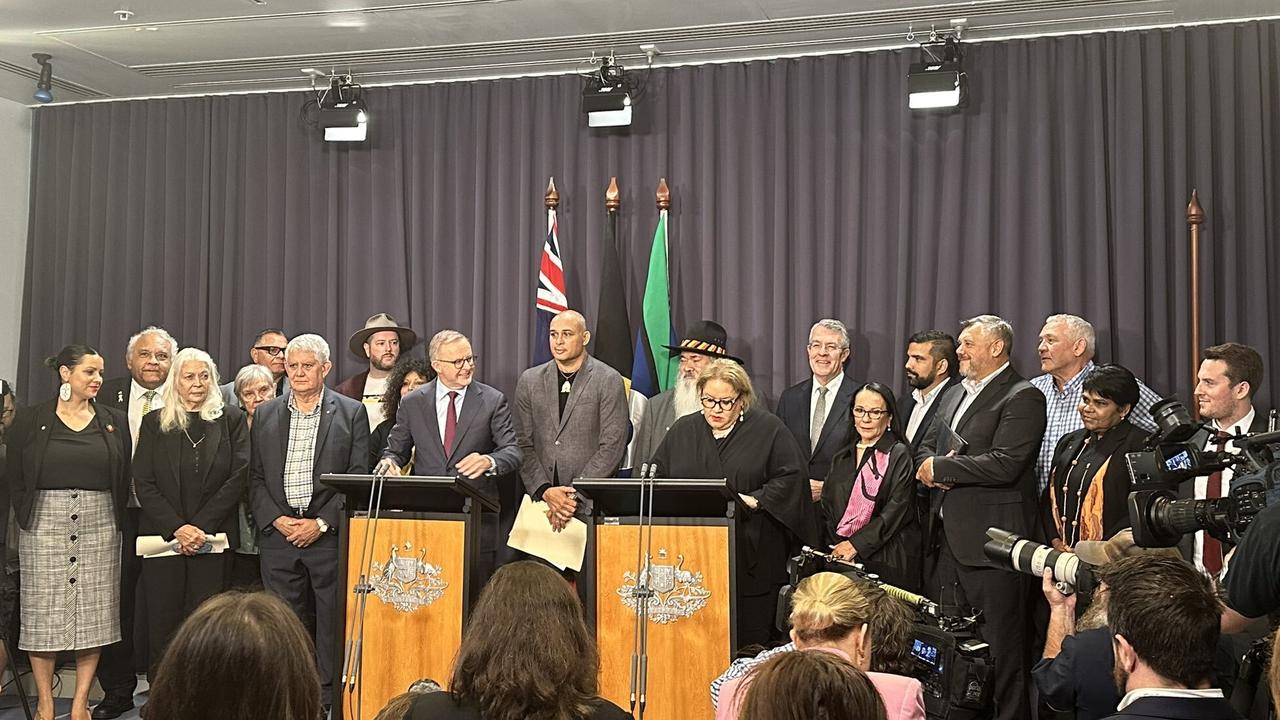
Mr Albanese said the constitutional provisions would enshrine the two “fundamental” and simple principles of recognition and consultation.
“First; recognition. As Australians, we have an extraordinary privilege we share this great island continent with the world’s oldest continuous culture and the nation should recognise this and be proud of it,” he said.
“People who have loved and cared for this country for 65,000 years and more, in countless ways, we embrace it as a source of great pride. And we should recognise it.”
Mr Albanese said the principle of consultation was “not a radical notion”.
“(It’s) a sensible and practical proposition that Aboriginal and Torres Strait Islander people should have a say in the decisions and policies that affect them,” he said.
CHANGE IN WORDING
The wording of both the question and the proposed constitutional amendment differs slightly from what Mr Albanese first proposed at Garma festival in East Arnhem Land last year.
The draft question put forward by Mr Albanese at the time was: “Do you support an alteration to the Constitution that establishes an Aboriginal and Torres Strait Islander Voice?”
The clause that would be inserted in the Constitution to enshrine the Voice in the nation’s founding document has also been changed from the government’s “starting point” version.
The new wording makes it explicit that the Voice may make representations to “Parliament and the Executive Government of the Commonwealth” rather than simply the “Executive Government”.
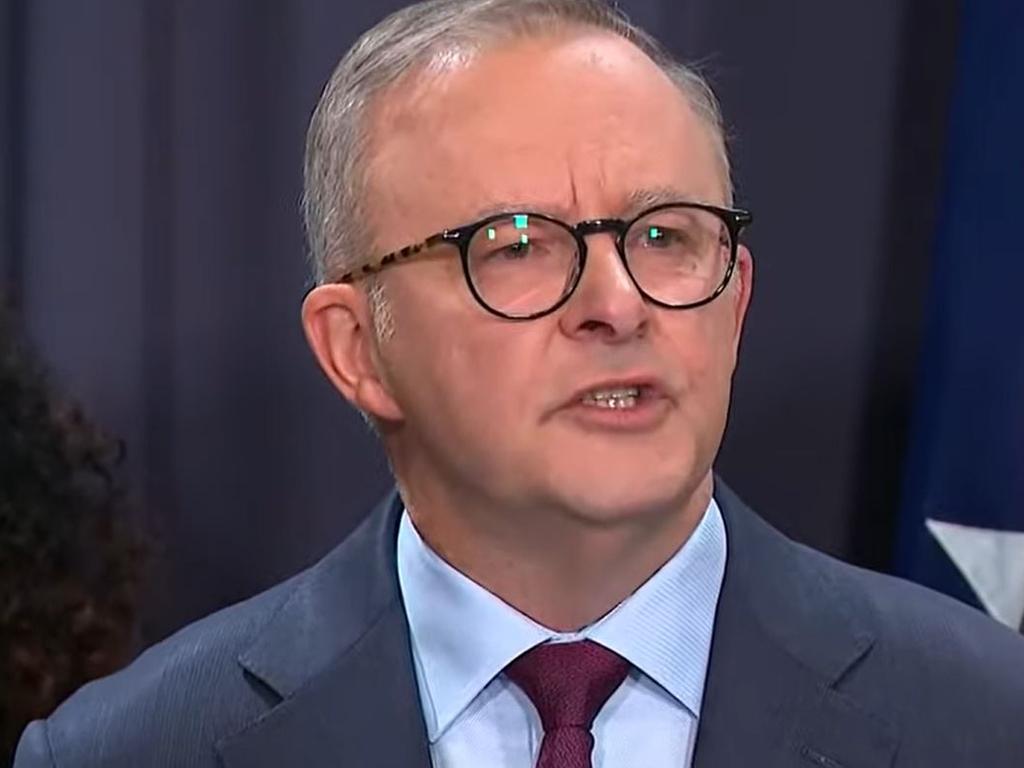
TOP LAWYER SEEKS TO ‘ERADICATE’ FEARS
Indigenous senior counsel and referendum working group member Tony McAvoy, who has been advising the government on the legal requirements of the Voice, said he wanted to “eradicate fears” people might have about the proposed advisory body.
Mr McAvoy outlined the principles that will underpin the Voice.
“A. The Voice will give independent advice to the Parliament and Government.
“B, it will be chosen by Aboriginal and Torres Strait Islander people based on the wishes of local communities.
“C, it will be representative of Aboriginal and Torres Strait Islander communities, gender-balanced and include youth.
“D, it will be empowering community-led inclusive, respectful and culturally informed.
“E, it will be accountable and transparent.
“F, it will work alongside existing organisations and traditional structures.
“G, it will not have a program delivery function.
“And, H, it will not have a veto power.
Mr McAvoy said the referendum working group encouraged everyone interested in the process to pay “close attention” to the design principles.
“This is how we set out where the Voice should go,” he said.
INDIGENOUS LEADERS SPEAK
Amending the Constitution is the form of recognition Aboriginal and Torres Strait Islander leaders asked for in the 2017 Uluru Statement from the Heart.
Labor promised to implement the statement in full if elected. The second step will be to hold a “truth-telling” process to eventually set up a treaty between Indigenous and non-Indigenous Australians.
Thomas Mayor, one of the signatories of the Uluru Statement from the Heart, joined Mr Albanese at his press conference on Thursday and told Australians: “Indigenous people will be watching”.
“We want this to be above politics. We are tired of having our lives used as a political football,” Mr Mayor said.
“We want all Australians to hear us, not just in rare moments like this, but any time decisions are made about us. We want you to believe in yourselves, believe in us, walking together, believe we can do better.
“We want the Australian people to vote ‘Yes’.”
Labor senator Pat Dodson, the government’s reconciliation envoy and former commissioner of the Royal Commission into Aboriginal Deaths in Custody, asked Australians for their help in repairing the relationship between Indigenous and non-Indigenous people.
“All Australians to see the significance that this moment, with this level of unity here, this level of magnanimity, that we as Australians can arise to a better relationship with our First Peoples,” Senator Dodson said.
“One where we are liberated and when our hearts and minds are clean from the tyranny of the oppression and suffering and shame that we have lived with.”
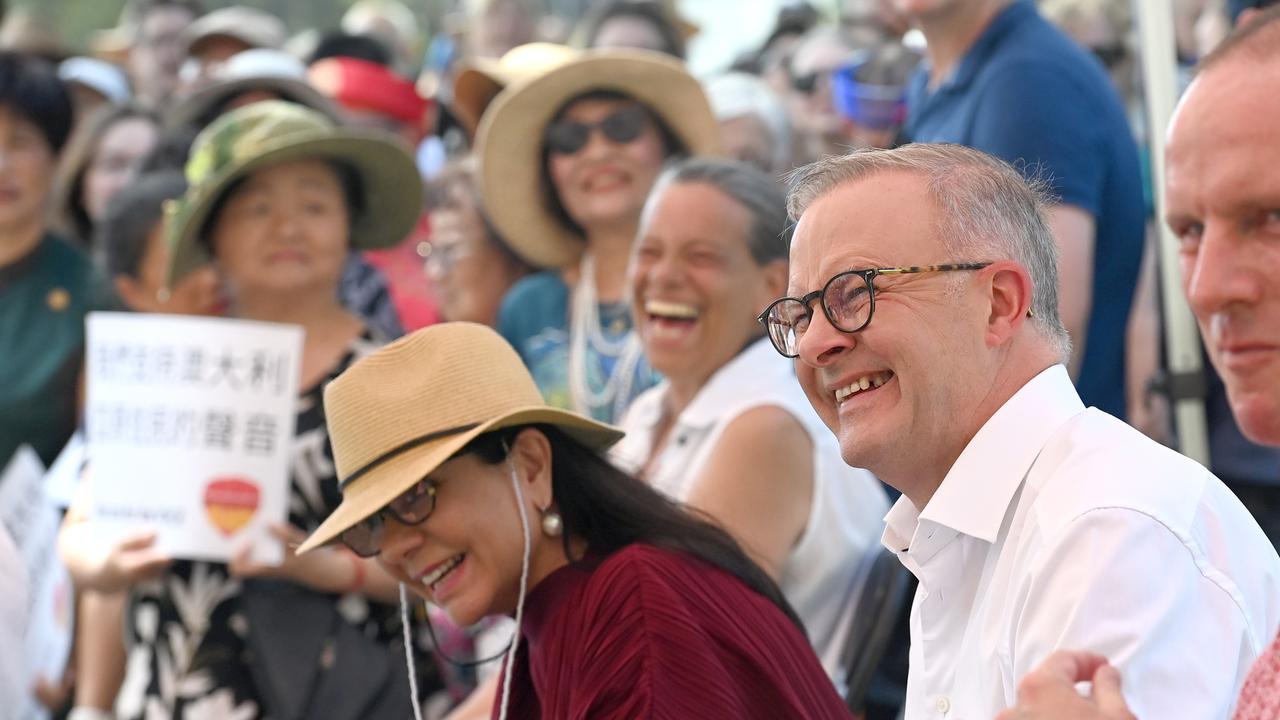
THE QUESTION OF EXECUTIVE GOVERNMENT
Mr Albanese confirmed the Voice would be able to advise executive government as well as the parliament of the day if the referendum succeeds, shutting down speculation it was going to be altered to win over conservatives.
There had been some disagreement over how the proposed change to the Constitution should be worded, including whether the Voice should have the power to advise the executive government.
Giving the Voice the ability to advise federal cabinet has been contentious among some conservatives and lawyers who are concerned it could lead to legal challenges in the High Court.
But Mr Albanese sought to allay those concerns on Thursday.
“I understand, but the referendum working group also had a legal team of the best legal minds in the country who have worked on this,” he said.
“And if you look at the tweaking of some of the words, based upon (that) advice, they make it very clear about the primacy of the parliament.
“This isn’t about veto or third chambers or anything else. It is about consultation and respect”
DUTTON RESPONDS
Responding to Mr Albanese’s announcement, Peter Dutton said the government should release advice from Solicitor-General Stephen Donaghue on the Voice and reiterated his demand for more detail.
“We’ll look at what the government has provided to us,” the Opposition Leader told reporters at Parliament House.
“At some point, you can only be strung along for so far without the detail, and you need to consider what the government has on the table and then we can make a decision as a party room, whether or not we support the Voice.”
Mr Dutton has routinely asked the government to reveal more of the specifics of the Voice and says he wants 15 “simple” questions about the advisory body answered before he can support it.
The government says the finer details will be hammered out by parliament through the usual processes after the referendum — if it succeeds.
But the government did reveal some specifics on Thursday after they were approved by cabinet, in releasing the referendum working group’s design principles for the Voice.
Voice members would be selected by Indigenous communities rather than being appointed by the government. They will serve fixed terms and fall within the National Anti-Corruption Commission’s remit.
Additionally, the Voice will be encouraged to advise the parliament and government early in the policymaking process.
The Voice will be given its own resources to undertake research and make representations to the parliament and government, although it hasn’t been specified how much funding it will be given.
The Voice would be able to make representations about improving programs and services, but it would not manage money or deliver services.

OUTSPOKEN CROSSBENCHER WEIGHS IN
Former Greens senator turned crossbencher Lidia Thorpe responded to the referendum working group’s press conference by labelling the Voice “yet another advisory body” and vowing to continue to “give agency” to First Nations voice that are being “silenced and ignored”.
“A group of so-called representatives hand-picked by the government, have endorsed a body that has no real substance for First Nations people, no veto rights or decision-making power and makes no immediate impact to saving the lives of First Nations people today,” Senator Thorpe said in a statement.
“High paid, hand picked members of the government’s campaign continue to advocate for a powerless body they will call the Aboriginal and Torres Strait Islander Voice, whilst our communities’ voices are being ignored all around the country.”
Senator Thorpe defected from the left-wing party last month to sit as an independent in order to “speak freely” and lead what she describes as a Blak sovereignty movement after a long-running disagreement with other Greens MPs over the Voice.
She said the Yes campaign continued to disrespect voices that had rejected constitutional recognition and called for self-determination and Treaty for generations.
“It might sound lovely and may make people feel good, but this proposed Voice goes against the governance structures that have existed in our communities since time immemorial,” she said.
“It moves our Elders further away from decision-making roles which goes against our cultural protocols.”
FEDERAL COALITION YET TO COME ON BOARD
The government’s referendum working group met with Mr Albanese on Wednesday evening as the Referendum Machinery Bill passed the Senate.
Labor struck a deal with the Coalition in exchange for their support on the legislation, which will modernise the way the commonwealth is able to hold the national poll.
The Coalition’s demand for equal funding for both campaigns was watered down to legislate a “neutral” education campaign to be run in the lead up to the referendum.
In addition, groups on both sides of the debate will be granted tax-deductible status.
The amended bill was agreed to by the house on the voices less than two hours after Mr Albanese’s announcement.
Its passage paves the way for the government to introduce the Constitution Alteration Bill to parliament next Thursday.
Australians are expected to vote in the referendum sometime between October and December.
Labor accepted the Coalition’s request to have the government distribute official pamphlets containing both “yes” and “no” campaign information has also been accepted.

The Liberal Party is yet to come to a position on whether or not it will support the Voice, citing a lack of details.
But opposition special minister of state spokeswoman Jane Hume said on Thursday morning she welcomed the government’s willingness to compromise on the referendum machinery legislation.
“We did secure many concessions from the government around the rules of the referendum – a pamphlet that goes to each household that outlines yes and no; fair treatment of yes and no organisations; and also made sure that there will be no putting your thumb on the scales by the government when it launches its civics and education program,” she told Nine.
“It must be a neutral program. If it isn’t neutral, there will be legal ramifications.
“Australians deserve to have their say, we just wanted to make sure it was a fair and free referendum.”
In brief remarks made earlier on Thursday, Mr Albanese urged the Coalition to rise above “party politics” on the Voice.
“I can’t conceive of why a political party would seek to bind its members to a position of opposition to a referendum,” Mr Albanese told reporters at a childcare centre in Queanbeyan.
“I respect the fact there are different views on this issue, there are different views on any issue before the Australian people but this is about our nation, this should not be a partisan issue.”
Government amendments also included the extending of mobile polling, ensuring voters living in remote communities and those in hospitals and aged care have an additional seven days – a total of 19 days – to vote.
Read related topics:Anthony Albanese



